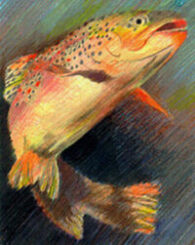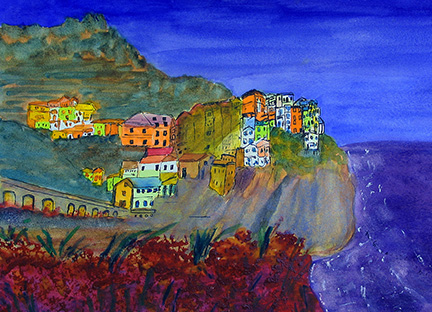
The following are Pilgrim poems published or accepted before 1990.
They include Pilgrim’s first poem from his sixth grade class — it happens to be the last poem below.
As the foundation of his work, they are part of his first 400 published in Seduced by metaphor: Timothy Pilgrim collected published poems.
Photos and photo-illustrations, most of them Pilgrim’s, along with watercolors by the late Mary Dale (photographed by the late Bud Dale), are sprinkled (mostly) at random among the poems.
Poems published in the 1980s
Angle of repose
It is only by degrees
we arrived at love’s central core.
One by one, like layered loam
scraped off bedrock
ready to support
some institution’s graying weight,
we peeled lesser habits away.
Showering together was first to go —
your breasts streaking my chest,
mouth nuzzling lips,
spray erasing suds
I’d laid on your chin
with one bubbled stroke.
Late-night dinners went —
Bach swirling amid candled shadows,
your head snuggling in crook
of chin and throat,
our humming moistened by Bordeaux,
dual notes drifting mixed
amid concerto wafting upward
cooling in waxened smoke.
Sleepy hours together turned fetal
became hug of knees —
no more pressing for warmth,
nose resting against neck
as breath ebbed and flowed
in perfumed hair,
thighs molded to derrière —
instead, one morning caress
final layer removed
yielding granite for our love
together. At last
we had a fine foundation to build on.
(published by Trestle Creek Review;
republished in Idaho’s Poetry: A
Centennial Anthology; Mapping water)
Birches: the father seeks absolution
(for Kamie)
Would half a lifetime of mistakes,
forty years of poor choices, be too much
to forgive? Perhaps ten thousand No’s,
thick bark cover driven
by paddle-gripping need
gained generations before?
Consider stinging stares,
finger-waving scowls
replete with lectures, all these standing
tall, ponderosa pines
not bending to your need
merely for my love? And punishment,
rules rigid, relentless storm
uprooting birches,
crashing them to forest floor?
Could these ever be absolved?
If you knew my tears squeezed back
longer than exile to crib,
high chair, darkened room,
could you begin to waver?
If you knew my remorse,
tousled hair, hugs — denied,
would you bring forth
some forgiveness, some pardoning,
some swaying of ponderosa strength
you now embody?
In short
if I with rope and tackle

located one uprooted birch,
pale bark rotting,
if I rigged pulleys with hemp
around scarred sides,
began pulling, sweating, straining
to hoist it majestic,
would you —
if not preoccupied with standing tall
in well-learned sternness —
would you dip down,
take rope, pull with me,
hearts open,
believing together
forest of ponderosas
would become lithe birches, swaying,
together bending low?
(accepted by Trestle Creek Review)
Catch-22 in Northern Idaho
White supremacists were denied a cross-burning
permit today because of tinder-like conditions
in the Hayden Lake area.
— Seattle Times
It was not my heat
alone or yours saying
in Nazi breezes
scoop up one white cat
clutch fur to chest
have for an instant
a monogrammed Yosserian coat
holding the very entrails in.
Soon purrs turned low to growls
claws stitching black reminders
saying I couldn’t have you
in the holding
or the setting free.
(published by Trestle Creek Review)
Coeur d’Alene spring:
Reliving his regret for the 23rd time
So begins another dusk, red sun
dipping below darkened sill,
departure, like yours, summoning
dim memory, lyric poem,
“The Pasture,” Frost’s account
of love dancing in me now,
partner to fading rays. I recall
New England speaker shy to lover
probably summer blonde
like you glistening tawny
in sun-streaked open pose,
I’m going to clean the pasture spring,
rake leaves away, maybe
linger as cloudy water clears;
I shan’t be gone long. You come too.
He planned to fetch a calf so young
it tottered under mother’s lick
the way your shivers quicken
when I nuzzle kisses up your sides.
You come too, he whispered a second time.
I wonder if lover seized that chance
took outstretched hand,
for one hour left tedious chores
behind, tromped arm and waist
with him away together
spongy meadow grass imprinting love
as they strolled, two yet one
passing afternoon under shadowed willows
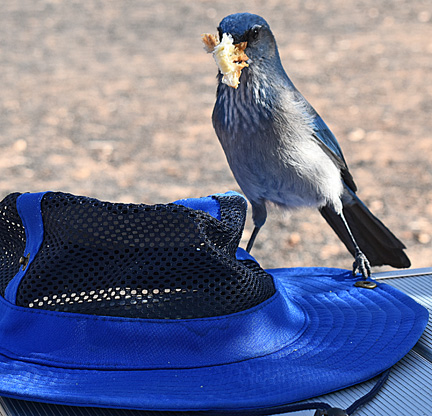
glistening white. Or did she too
allow burdens, not quite trivial,
not yet mundane, to clog spring again,
choke pasture grass, say, Sorry,
much to do before summer comes?
I hope he smiled, knew muddied water
bawling calf, meadow also waited
tending. I hope he managed
one more won’t you come too?
just before the leaving.
(published by Trestle Creek Review)
Conspiracy of vegetarians
Before we raid the salad bar,
we must plan how to avoid
gun emplacements, bunkers,
camouflaged snipers lying in wait
among moist onions. As dawn comes
rebellion red, we’ll swoop down,
zigzag through the cafeteria, sweep past
that damned fifty-cents-an-ounce sign,
outflank troops waiting to behead
those daring to sneak an olive in
before they reach the scale.
Havoc-wreakers of three-bean salad,
we’ll pillage cowering bowls of lettuce,
plunder carrot trays, take
the most slender bread sticks hostage.
It is then we’ll ride off,
marauders splashing wild through pools
of blue cheese and Italian dressing,
dragging bean sprouts behind us. Yes,
we’ll finally have our way with broccoli.
(published by Trestle Creek Review)
Cuddly Bear snares the Copenhagen beauty
(with a nod to Paul Bair and Barry Baker)
Her skin whipped Indian brown
by Montana wind
cries free me to faded Levis,
almost escapes, thighs gone wild.
Little Bear, cuddly
beyond his nineteen years, sees love
nestled deep in tight jeans
taut blouse — tobacco-filled cheek.
He, also hip-pocket-white-ring
shouting Copenhagen to the stars, knows
she sways smiling
not because cowboys grin
shy at her red hair,
green eyes. Not because drunks
stagger past, caressing,
round, riveted cheeks,
heavy hands probing.
But yes because she too knows
before Missoula night
slips by, before Big Dipper retreats
from rodeo dawn, before winds rise
bronc-riding warm,
her brown breath will ooze,
swirl with bear breath,
both panting home the stars.
And Cuddly Bear, brown eyes, brown teeth
flashing as he blows juice
straight and true,
knows let-me-go moans,
jeans, tanned cheeks
will be his by dawn, will become
snoose-covered love
spitting out the sky.
(published by Trestle Creek Review)
In which he accepts the feminist point of view
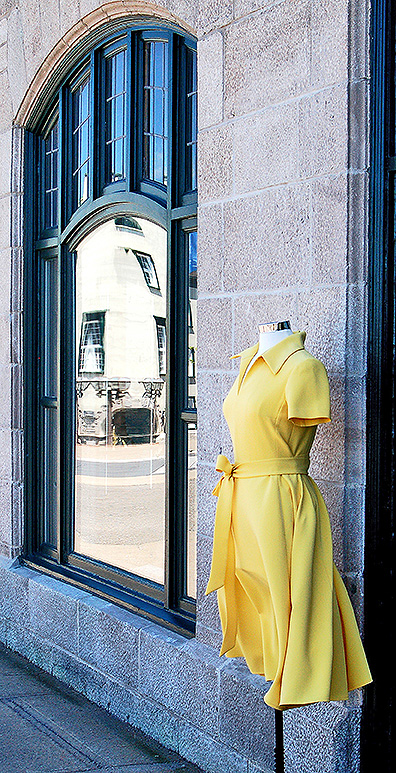
Geese sweep past in blackness,
vee their driven way north,
forms outlined gray
against the full moon.
I am certain it must be
a female who veers
off, fights her solitary way
up the gaggle’s ragged edge,
takes her turn in the lead.
She slices night sky
with fresh fierceness.
We tromp wet beach together.
I sink barefoot,
filling your tracks in the sand.
(published by Trestle Creek Review)
Ketchum, Idaho: At the Hemingway Memorial
Corner tavern, call it Slavey’s.
Jami — with an i — barmaid
eight weeks now, going on nine,
waves you up this canyon — Sun Valley,
where women, forty, sweatered tight,
lure wanderers, eyes ablaze,
to condos October brown,
autumn sunlight going
down. Here, Paul Anka,
no longer crooning
Fifties tunes,
hums lullabies to night.
Here, Sun Valley carpets
red as your eyes
soak up old men,
themselves absorbing winks
barmaids serve, fondling
pointed invitations
before fatigue sets in,
taking them petrified to sleep.
Lives here all wheeze
as one, mostly for young breasts —
breasts that wives, naked
near Anka’s place, also moan for.
Here, flames consume cottonwood,
itself dead since Hemingway blasted out
his brains another lost generation ago,
Idaho’s only genius,
flowing dark crimson
to death, fomentation, peace,
union — vivid testimony
to Ketchum’s insane games.
One mile beyond Sun Valley, above
lovers gone cottonwood bad,
his bronze bust, cloaked purple now
by mountain shadows, guards
some faded plaque, inscription saying
he dearly loved high, blue,
windless skies. You, here, like him,
in wind — clouds slipping pink
to black — grip no gun, lack brilliance,
have no courage to greet death.
Can breasts, even Jami’s, rising
to meet night, or old ones
dying in time to fire,
keep you wandering, searching
for meaning, not just Sun Valley’s,
but meaning Hemingway gave up on
when he squeezed away his life?
Or will you hobble hills to senility,
watch mates take their place
in the valley, outglow embers,
moan away Ketchum nights, as you doze,
tightening your grip on the sky?
(earlier version published by Trestle Creek Review)
Late autumn run beside Lake Fernan
Rippling waves flow in, out;
each moist breath comes fast
then goes, so I pant
happy to be striding strong,
Fernan’s green surface
lapping at my side.
I wish you, your slender thighs here
to match me breath for breath
sway for sway.
In my moss-fringed race,
shadow dancing gray
to green, I accede to the rhythm,
pound again repeating
a solitary plea:
come run these
miles at water’s edge,
lope each spongy trail, come
surge like clouds
painting shadows across this path.
But soggy footprints
shouting runner to applauding rain,
pulsing waves,
even these know
no lithe companion, no curving shadow
of hips and breasts
drift across moss or lake
blow in, mingle,
brief breeze rushing past in mist,
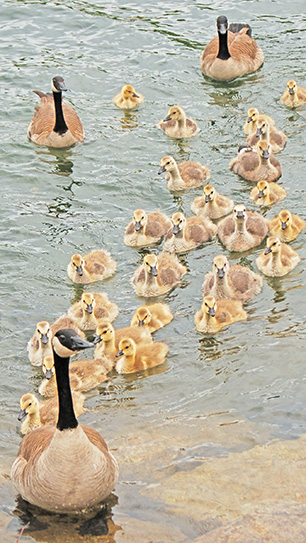
what effort I expend
to envision your form beside?
Perhaps like wind
chasing beleaguered clouds, someday
I’ll flow your shadow’s edge
finally stop reprieves
promised with each step
and breath. Until then my crazy lungs
will frost the October sky.
(published by Trestle Creek Review)
Phoning from the ant farm aisle at Spokane Pets
I’m watching them half-envious, lover.
Ants dutifully bury their dead,
grieve quickly, then return still working,
the ceremony almost too brief.
They carry on. Crawl caved-in lives.
Lug loads thirty times their weight
through sandy passages dreary
as Seattle winter. Sometimes
two of them meet, caress
each other in darkness,
tap out a lack of space,
make their ways past
in tunnel freshly dug,
being oh so careful
not to prolong
any touch — then hurry on,
gloomy lifers without reprieve.
Forgive such babbling,
love. I really called to say
only three more stops —
two out east, one at the mall.
Keep your candlelight soft,
your wine red, warm. We’ll lie together,
kissing all night in the hall.
(published by Trestle Creek Review;
spinoff version, “Text from the exotic pets store,”
published in 2020 by Tipton Poetry Journal)
Poet’s crossing at Pillar Point
You make your choice by choosing you.
In half light, not white, not gray
your own castaway grips one oar
itself lashed tight to open boat
trapped by strait and rocky shore.
No easy choice, this one of foam
waves tipping white, milked-out coast —
alabaster dashed on stone.
Pulse thumps time to brine, to spray.
Steers its own circuitous route.
Drunken critics stagger bluffs,
note milky struggle, cheer your craft
spinning mad outside the surf. They
don’t know it’s you, but if they do
prefer Juan de Fucan wind
to foundered dinghy, one choked oar.
Circle widening, white wake in foam
choice or choosing — surf or stone.
(published by Quaint Canoe)
Pre-dawn vigil at Kootenai Medical Center
(for John)
Son, thou are ever with me, and all that I have
is thine.
— Luke 15:31
My only son lies unconscious,
tubes dripping hope into cheeks
flushed ruby by I.V. flow. I see
last summer’s campfire we two
blew to life in meadow dusk,
anglers’ attempt to keep Montana cold
from freezing fingers off our fished-out hands.
Today’s trip testing Priest Lake alone
netted his limit of poison,
not nearly as much fun as bringing in
three cutthroat now untended,
glass-eyed beside the vacant boat.
I wish for Montana twilight, we both
shivering back the day’s rainbows
eager fighters jumping against the sky,
fierce competitors for Royal Coachmen
arced toward their stream —
invitation to exchange
icy creek for burlap creel.
Night flames took crackling hold,
licked lodge pole twigs gray with age.
I roughed his hair, brushed fire-red cheeks,
let loose laughter that followed ash
to coolness in the floating smoke.
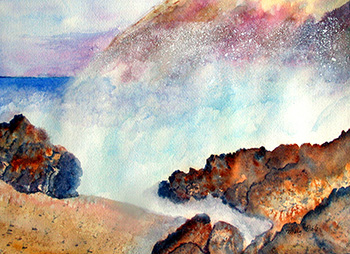
His chest rises, dives deep
in this struggle to keep life.
I hook his hand in mine,
squeeze and release with each faint breath.
At times I see sparks
sputtering against the night sky.
(published by Trestle Creek Review;
republished in Idaho’s Poets: A
Centennial Anthology; Mapping water)
Poems pre-1980
Born of man
Born of man, born of man helpless.
Brought forth from death
to suffer life.
Hippies beckon. Black men revolt.
We want out.
Parents deaf cannot find time … time.
A man born a mound of clay,
shaped in the image of violence,
reared in hate —
but he was such a good boy.
Exposed from the first
to hours of muck, to minutes of love;
ten roads stretch out,
yet one leads right.
Figures in the dark…
a flick of a knife …
bomb blasts black church …
all hell broke loose …
youth saves drowning child —
for a rich, full life?
Goodness is there —
there to be fought for,
there to be grasped,
and there to be won.
A man who wins goodness,
who struggles for truth,
for honesty, for justice,
who would sacrifice life
for ideals he believes in;
this man who wins goodness,
this man of courage,
this man to esteem —
also the man who wins grace.
(published by The Muse)
Face the muse-ic 1
Why the PE complex, Muse,
if they who teach reserve its space
for their own use and our distaste?
Can mortals not be reimbursed
who at their own discomfort pay
for structures springing up today?
When leisure time relieves their woes,
what purpose will enjoyment serve
with signs of Rules and On Reserve?
Can students selfless be in deeds
when faculty fulfill their own needs?
Mortal, thou in anger speak
and judge cruel statements I cannot.
True it is that unfair rules
reside within your PE dome,
but On Reserve of that you speak,
students have use 2 nights a week!
The complex cost, while pay you must,
completely on your fees lies not,
and if withstand the long, red tape,
time is yours to get in shape.
But as for those who must instruct,
be patient while they consecrate.
Recall the saying with meaning told:
The child’s new toy soon grows old.
(published or accepted by Wescolite)
Face the muse-ic 2
What of our state of mind, O Muse,
and why do we of a nation great
not see or sense our obvious fate —
the end that comes from pessimism
and nothing more than criticism.
The people stand with outstretched hand
and shove and push across the land
yet do not see the hour glass sand
is running out and soon will be
draining away to eternity.
Mortal, mortal, your look of gloom,
though not unjust and wholly wrong
is aimed at but the lowly throng,
not at ones who wise will be
enough to keep your country free —
but given time the dawn you’ll see.
It’s true that some could never care,
could never rise to meet the dare,
would help their country not, yet cry
for aid and welfare until they die.
But most put on the yoke of toil
and to their country are ever loyal.
These people of strength will stand up tall
and by the fates shall never fall.
(published or accepted by Wescolite)
Face the muse-ic 3
Tell, O muse, of he who ran
that lowly race and won.
What of tales that seem to say
he won his office by decay,
that honor slowly sank away
until empty office soon he held.
His margin slim, all through the day,
so he on ballot box did stand
to make the voters lend a hand.
The one whose victory severed he
is one with honor still to be.
Will wrong keep loser from his post,
and will the victor always boast?
True these tales, O mortal, be,
but grant the victor amnesty.
The hunger of a rat for cheese
will bring a giant to his knees.
Though defeat has been his tea,
a better man the loser be —
knowing that he played it fair,
still only missed it by a hair.
Respect of character has no price,
and lack of honor won’t suffice —
the victor lies below the dice.
(published or accepted by Wescolite)
Face the muse-ic 4
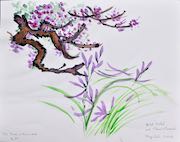
Is the path well marked, O Muse,
the path of life on which we grope?
Will torches burn to show the way
along the cliff that leads to death?
Does the forest of happiness lie
in the mountains of our life,
or will we seek to find what’s not
and watch what’s been go floating by?
Black the path of life now seems
to us who are a few yards gone,
and as the black blots out the day,
all we sought seems to fade away.
O mortal, life is strange,
and often one’s future is obscured
by melancholy; hopeless feelings
abound within faint hearts of men.
Happiness is not, but is to be
in the depths of yesteryear’s sea.
Revealed is not the way of death
to mortal men with insight scant.
Crushed thy feeble brain would be
to see the future — so you can’t.
But on life’s path, look ahead
and though you see not what you dread,
still it lies within your stead
to soon appear and make you see
that what you want can never be.
(published or accepted by Wescolite)
Face the muse-ic 5
Tell of wily Red Eye, Muse,
and if he stand on rock or sand.
Is the mask from which he peers
concealing more than mortal name?
Does this critic match the wit
and ideals of we who stand
alone to take the brutal blows
for words we turn into mistakes?
Does air that whistles from his words
blow hatred thoughts through our minds,
or will we listen, nod and turn
to walk away, the truth to find?
Mortal, mortal, do I detect
a wisp of wonder for he who hides
behind the mask of one Red Eye?
It’s true that blurred his vision is
when through a mask he tries to stare
and then to rip at all in view.
Not called reform or criticism,
but a yearning of the mind,
is the single sheet of feeling
published when the urge is nigh.
Heed not the words of stinging passion,
for in time they will have died.
Quickly memories of Red Eye
reach their peak and then subside.
(published or accepted by Wescolite)
Face the muse-ic 6
Tell of the sleeping giant, O Muse,
and why it chooses now to wake
from its sleep and try to take
the world apart — mankind to break.
The years rolled by, and it wakened not,
and though the world from battle shook,
the stupor of the giant prone,
was not affected until the drone
of planes with bombs its flesh had blown
to little bits that scare had bled
before it turned to bloody red.
O mortal, yes this giant slept
for centuries, now wakes its plots once more
to lead the world as it did before —
to crush and kill with shout and roar.
Lowly man is near the day
when all his flesh will fast decay;
the trumpets of none will softly play
yet across the earth ill winds will blow.
(published or accepted by Wescolite)
Face the muse-ic 7
Is opinion, O Muse, of man’s creation
born and reared? Are minds so small
that what we read is timely,
terse — and always true?
And those who write, are they the molders
of man’s brain of clay? Are many
now so put asunder by the greedy works
of blinded men that rue men suffer still
again beyond the ghastly grave?
Lewis, Hemingway and Kennedy
hear your words, ye mortal man —
and they smile. Always authors
augment not the greatness men should do,
but dwell on facts important not.
As to death the great men go,
so unknowns must search for fame.
Grahams and Hotchners will abound,
but those who read disgusting trash
should soon recall the speech of Brutus.
When men write, the public owns;
when man reads, the words are food.
(published or accepted by Wescolite)
Face the muse-ic 8
Tell us, O Muse, of those who judge
the way of life of us of youth
with time ahead. Is not the sword
of double edge now in his hand
who once was victim of its keen
and shining blade? Does not his mind
with looming, ebony thoughts of life,
contain a speck of hope for future years?
If time does this to able men,
when will the lesser seek to sear?
Mortal youth, within your state
of wise confusion lean lies the insight
sorely sought. Time is that of total
life to man, and overtake him
soon it shall. Now the sword is in
man’s hand, and soon the swing will start
its swift and silent downward blow.
The flare of tempers, the blame of youth
are not the forces to stay the sword
and dam the river filled brimming full
with crimson blood and bobbing heads.
Keep in mind that of mortal men,
the meek will reign and rule Earth of green —
or black — or that which stands.
(published or accepted by Wescolite)
Face the muse-ic 9
Tell us, O Muse, of the one so fair
and bold as to lead a country free
down the traveled path to agony.
Does this man from the land of waste —
this god who bides his time and then
comes forth to take the mighty helm,
millions of people to overwhelm?
Unto all Caesars a Brutus so true,
yet so noble a nation doth not comprehend —
not caring or asking but asleep to the end,
taking this traitor for such a good friend.
O, restless mortal with mind so so quick,
you view the web of life of he
who powerless never happy will be
until he too should have a part
in shaping destiny for lowly man.
Even now across the wide expanse
of blue this mortal leads
but does not see the pit below —
the pit of death that will bestow
the River Blood, but it is so.
Wrong before this land has been
in taking paths that never end
with victory, but sad defeat,
and now with fate again will meet
to make its turn of coat complete.
(published or accepted by Wescolite)

Face the muse-ic 10
Tell us, O Muse, of a citizen high
whose well liked mind as of late
has convinced himself that he is great.
He thinks among men that he alone
should yet receive the biggest bone,
and too the harvest lately grown.
Why do people liked so well
permit their pride in size to swell
and grow so blind as not to see
good friends and more begin to flee
from such unwanted company?
Mortal, you speak of he who local lies,
and lately slashed at those of blood
with tongue and thus began your flood.
Tis true he sees his position not
nor shall obtain ideals he once sought
but soon shall gain the hate he’s fought.
Even now it rises in those he needs,
but being vain, he never heeds
that being royal and dashingly bold
in casting loved ones in such a mold
will leave him empty air to hold.
(published or accepted by Wescolite)
Face the muse-ic 11
Tell, O Muse, of those so poised
to forfeit texts on school’s first day.
Are they in need of sleep so sweet
that not until noon do they open doors?
In stupor bliss do they not see
a line that stretches to eternity?
What kind of people with task before
would not prepare until the dawn
of that same day the task was on?
Will every quarter students have before
to wait the line they most abhor?
Mortal, thou with fury speak
of those whose task so hard must be.
They alone withstand the gale
of students’ lust for knowledge “bound.”
So great the job they must complete
that face it early they cannot.
Thus, staked on books at early dawn,
struggling vainly against the throng,
slowly they sink from reality
with mental blocks that rise up tall.
They know students will wait the line
that leads to lucid learning fine.
(published or accepted by Wescolite)
Memories of Ski Gulch
Now that gold seems free,
elusive flakes we panned
lay glittering in my mind.
Hoarded nuggets seeking love.
Water carrying wealth
to a miner’s pouch still flows,
but aspen groves of guilt
won’t let gold fever finally die.
Someday I’ll trudge your sides
again, bring shiny bits
floating to the surface. Then,
tell me buttery metal we panned
was made for tempting fools.
(published in National Anthology of Poetry)
Retort
You dare skulk in here,
hate running off like tallow,
asking my forgiveness.
Take your whimpering fears,
your trembling ways of pleading.
Lick your wounded ego
and turn and face the wall.
(published in National Anthology of Poetry)
Teacher bigot
You stand there fat
and smirking, gleefully
forcing us to eat
your idiotic drippings.
Think we are hungry.
Why not smash our faces,
and toothless, enjoy our gurgling
beneath your bloody boot?
(published in National Poetry Anthology)
Walls of wisdom
Within the walls of wisdom
will I take my stand, or
over the fences of learning
to knowledge shall I flee?
On endless shores of experience
I will spend my days,
until the hand of death
shall grasp me, clutch me, pull me down
and leave my years of searching
lying in the sand.
I sought truth and beauty,
leaving always ignorance
upended in my wake.
As I learned and laughed and knew,
the last frontier of knowing loomed
clear within my view.
Insight was the rusty key
that turned the lock in future’s door,
that brought together grains of wisdom
within the hourglass —
trapped inside by fleeting time
to struggle in the dark.
Until the false should sink below,
then slowly slip away.
I learned what man was thinking,
what he was dreaming of;
I glimpsed the fate of nations
and what they did not heed;
all there was to know and learn,
everything I saw,
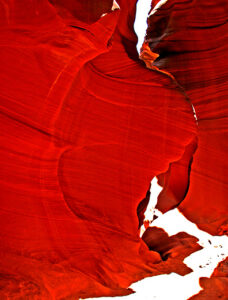
but then the glass of time
ran out, and I was there —
no more.
(published by The Muse)
The woods near our home
In the woods near our home, we hear
the gentle drops of rain,
through the trees.
Just a soft pad passing leaves
though it sounds like many feet.
The leaves fall gently too in those woods
near our home.
The wind blows cool, oh so cool,
and the stream runs away refreshing,
so refreshing.
(Pilgrim’s first poem, published in his This is my life booklet, elementary school, Dillon, Mont.)
